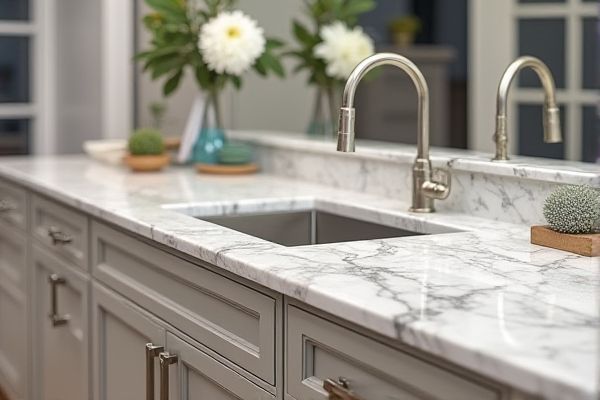
Quartz countertops offer consistent patterns and low maintenance, making them perfect for busy kitchens, while granite provides unique, natural stone beauty with exceptional durability and heat resistance. Explore the rest of the article to discover which option best suits your style and functionality needs.
Table of Comparison
| Feature | Quartz Countertops | Granite Countertops |
|---|---|---|
| Material | Engineered stone: crushed quartz mixed with resin | Natural igneous rock |
| Durability | Highly durable and non-porous | Durable but porous, requires sealing |
| Maintenance | Low maintenance, no sealing needed | High maintenance, periodic sealing required |
| Stain Resistance | Excellent stain resistance | Moderate, can stain without sealing |
| Heat Resistance | Moderate, sensitive to high heat | High, withstands hot pots |
| Appearance | Uniform colors and patterns | Unique, natural veining and color variations |
| Cost | Moderate to high | Moderate to high |
| Environmental Impact | Manufactured, some resin use | Natural, quarrying impact |
Introduction to Quartz and Granite Countertops
Quartz countertops are engineered surfaces made from natural quartz combined with resin and pigments, offering non-porous durability and consistent patterns ideal for kitchens. Granite countertops are natural stone slabs quarried directly from the earth, celebrated for their unique, aromatic veining and high heat resistance. Both materials provide exceptional hardness and longevity, but quartz requires less maintenance due to its resistance to stains and scratches compared to granite.
Composition and Material Differences
Quartz countertops are engineered surfaces made from approximately 90% ground natural quartz mixed with resin and pigments, offering consistent patterns and superior durability. Granite is a natural igneous rock composed mainly of quartz, feldspar, and mica, featuring unique, varied patterns formed through geological processes. Understanding these composition and material differences helps you choose a countertop that balances aesthetic preferences with maintenance and longevity requirements.
Appearance and Design Variety
Quartz countertops offer a consistent, uniform appearance with engineered patterns that mimic natural stone, providing a wide range of colors and finishes including glossy, matte, and textured options. Granite countertops showcase unique, natural veining and color variations, making each slab one-of-a-kind with a more organic and rustic aesthetic. Quartz designs tend to be more modern and versatile, while granite appeals to those seeking distinctive, bold, and natural stone patterns.
Durability and Longevity
Quartz countertops offer exceptional durability due to their engineered composition, making them highly resistant to scratches, stains, and heat compared to natural granite. Granite countertops provide natural strength and longevity, often lasting decades with proper sealing and maintenance to prevent moisture infiltration and surface damage. Both materials excel in durability, but quartz's non-porous surface enhances resistance to bacteria and reduces long-term upkeep compared to granite.
Maintenance and Care Requirements
Quartz countertops require minimal maintenance due to their non-porous surface, which resists stains and bacteria without sealing. Granite countertops, being porous, need periodic sealing--usually once a year--to prevent staining and moisture absorption. Both materials benefit from using mild soap and water for daily cleaning while avoiding harsh chemicals that could damage their finish.
Cost Comparison: Quartz vs Granite
Quartz countertops typically range from $50 to $150 per square foot, with prices influenced by factors such as brand, color, and fabrication complexity. Granite countertops cost around $40 to $100 per square foot, depending on the stone's rarity and origin. When considering your budget, quartz often carries a higher upfront cost but offers consistent durability and lower maintenance compared to granite.
Installation Process and Considerations
Quartz countertops offer a more consistent installation process due to their engineered nature, allowing for precise cuts and easier fitting in typical kitchen layouts. Granite requires careful handling during installation because it is a natural stone prone to chipping and cracking, often necessitating experienced professionals to ensure proper sealing and support. Your choice between quartz and granite directly affects installation time, cost, and maintenance considerations based on these material properties.
Environmental Impact and Sustainability
Quartz countertops are engineered using natural quartz combined with resins, which involves energy-intensive manufacturing but allows for precise waste control and recyclable components. Granite countertops are quarried directly from the earth, resulting in significant land disruption and transportation emissions but requiring minimal processing compared to quartz. Your choice between quartz and granite can influence your kitchen's sustainability footprint, with quartz offering some eco-friendly benefits through engineered materials and granite providing a natural yet resource-heavy option.
Pros and Cons of Quartz Countertops
Quartz countertops offer remarkable durability and non-porous surfaces, making them highly resistant to stains, scratches, and bacteria, which ensures easy maintenance and long-lasting appeal. Their wide range of colors and patterns provides versatile design options, though they can be more expensive than granite and less heat-resistant, requiring care with hot pots or pans. Your choice of quartz combines aesthetic flexibility with practical benefits, but weighing budget and heat tolerance is essential before installation.
Pros and Cons of Granite Countertops
Granite countertops provide exceptional durability and heat resistance, making them ideal for high-traffic kitchens and frequent cooking. Their natural stone appearance offers unique patterns and a luxurious aesthetic, although the material requires periodic sealing to prevent staining and bacterial buildup. High cost and potential for chipping or cracking under heavy impact are important considerations for homeowners weighing granite's long-term value and maintenance requirements.
 homyna.com
homyna.com